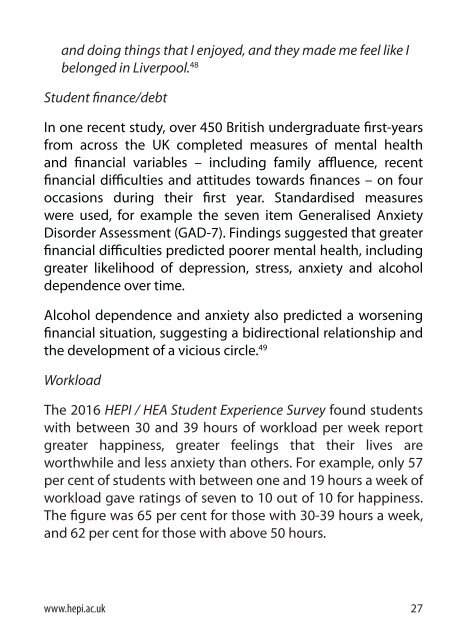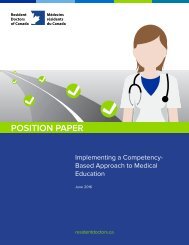The invisible problem? Improving students’ mental health
2cU9ATf
2cU9ATf
You also want an ePaper? Increase the reach of your titles
YUMPU automatically turns print PDFs into web optimized ePapers that Google loves.
and doing things that I enjoyed, and they made me feel like I<br />
belonged in Liverpool. 48<br />
Student finance/debt<br />
In one recent study, over 450 British undergraduate first-years<br />
from across the UK completed measures of <strong>mental</strong> <strong>health</strong><br />
and financial variables – including family affluence, recent<br />
financial difficulties and attitudes towards finances – on four<br />
occasions during their first year. Standardised measures<br />
were used, for example the seven item Generalised Anxiety<br />
Disorder Assessment (GAD-7). Findings suggested that greater<br />
financial difficulties predicted poorer <strong>mental</strong> <strong>health</strong>, including<br />
greater likelihood of depression, stress, anxiety and alcohol<br />
dependence over time.<br />
Alcohol dependence and anxiety also predicted a worsening<br />
financial situation, suggesting a bidirectional relationship and<br />
the development of a vicious circle. 49<br />
Workload<br />
<strong>The</strong> 2016 HEPI / HEA Student Experience Survey found students<br />
with between 30 and 39 hours of workload per week report<br />
greater happiness, greater feelings that their lives are<br />
worthwhile and less anxiety than others. For example, only 57<br />
per cent of students with between one and 19 hours a week of<br />
workload gave ratings of seven to 10 out of 10 for happiness.<br />
<strong>The</strong> figure was 65 per cent for those with 30-39 hours a week,<br />
and 62 per cent for those with above 50 hours.<br />
www.hepi.ac.uk 27





